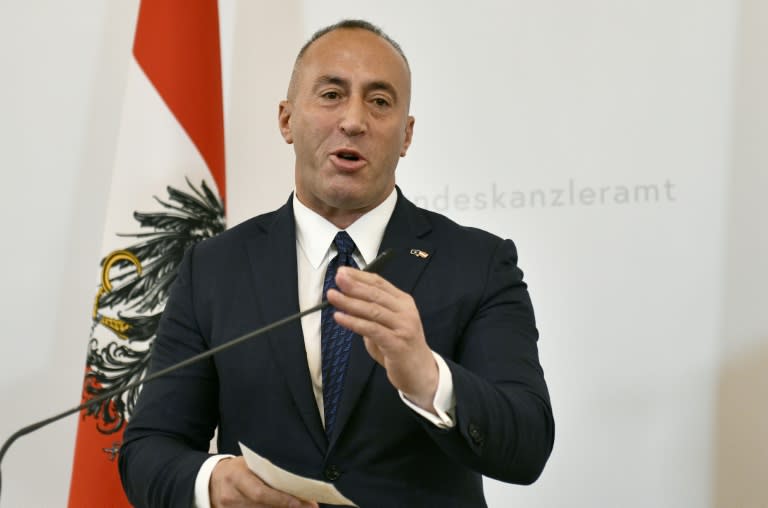Justice at last for Kosovo's 'second-class victims'?
Twenty years after the war for Kosovo's independence, victims of alleged war crimes committed by ethnic Albanian guerrillas have all but given up hope of justice. Now, finally, relief may be on the horizon. Kosovo's press is speculating feverishly that an EU-backed international court, based in The Hague, could this week issue its first indictments for Kosovo Liberation Army (KLA) veterans who led the 1998-99 independence war. Tiny Kosovo's Albanian population suffered most in the conflict against much-stronger Serbia, which ended with an 11-week NATO bombing campaign. But a section of Kosovo's ethnic Albanian population, as well as the territory's minority Serb and Roma, were targetted by the KLA and feel their suffering has been forgotten. They refer to their fallen as "second-class victims". "This tribunal presents the last chance to shed light on the assassinations in Kosovo," said Beriana Mustafa, a 36-year-old journalist in Pristina, whose father was murdered outside his house after criticising rebellion commanders. The world's attention has focused on atrocities committed by Serbian forces under strongman Slobodan Milosevic, who died in prison in The Hague in 2006 while awaiting trial on 66 counts of genocide, war crimes, and crimes against humanity. While leaders on the Serbian side have been judged and sentenced by the International Criminal Tribunal for the former Yugoslavia (ICTY), no KLA leaders have been sentenced. "Hope is always the last to die," said Natasa Scepanovic, 54, who leads an association of Serb victims still holding out for justice. Her own father's body was discovered in 2003, years after he was killed. Her mother is one of about 1,700 people still listed as missing. Kosovo's prime minister, Ramush Haradinaj, was acquitted by the ICTY for alleged crimes committed when he was a KLA commander. The court also exonerated ex-commander Fatmir Limaj, who heads a political party now in Kosovo's governing coalition -- a slap in the face for many KLA victims. - Dead witnesses - The Kosovo conflict left more than 13,000 dead, including some 11,000 ethnic Albanians, 2,000 Serbs, and about 500 Roma. The territory of some 1.8 million people unilaterally declared independence from Serbia in 2008, but Belgrade still regards Kosovo -- recognised as a state by over 100 UN members -- as its southern province. In 2008, crimes allegedly committed by the KLA were highlighted in a book published by former ICTY prosecutor Carla del Ponte. That was followed in 2011 by a Council of Europe report alleging the KLA carried out kidnappings, assassinations, unlawful detentions, and other crimes during and after the war. The EU-funded Kosovo Specialist Chambers (KSC) was created in 2015 to investigate alleged KLA crimes -- including the deaths or disappearances of some 500 individuals, including 400 Serbs. Speculation abounds about who will be targeted with indictments, and whether President Hashim Thaci, who was the KLA's political leader, will be among them. While heartened by the prospect of indictments in the pipeline, Mustafa noted that prosecutors will likely be dealing with incomplete evidence, eroded by the passage of time and witnesses dying. Her father, Xhemajl Mustafa, was an adviser to Kosovo leader Ibrahim Rugova, of whom a large portrait still looms over the central square in Pristina today. Remembered by some as the "Father" of Kosovo, popular Rugova represented an obstacle to rebel groups' aspirations for power, resulting in several allies, including Mustafa, being assassinated. No-one has been brought to book, but indications are this may soon change. - A 'just' war - Arianit Koci, a lawyer for wartime KLA commanders, Rrustem Mustafa-Remi, 47, and Sami Lushtaku, 57, told local media on Friday that the pair have been summoned to answer questions in The Hague on Monday. The court declined to comment. A third man, 48-year-old Sylejman Selimi, had not made the journey to The Netherlands by the end of last week, citing medical reasons, while a fourth, 54-year-old Remzi Shala had indicated he will ignore any summons. In December, investigators travelled to Pristina to question Sokol Dobruna, the 79-year-old former head of a wartime guerilla court. Despite the speculation of imminent indictments, many remain doubtful that justice will ever be served. Serb Marinko Djuric, 59, who lost his father and six other family members in the war, was pessimistic. "Everything that has happened suggest that these cases will never be concluded," he told AFP.



